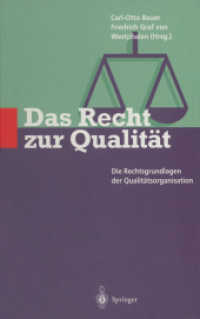- ホーム
- > 洋書
- > 英文書
- > Computer / General
Full Description
Group testing emerged as an area for research from the need for the US Government to screen recruits in the second world war for syphilis. Obviously rather than testing each recruit, a more efficient method involving the minimal number of tests was required. The central problem of group testing is thus: Given a number of items and a number of defectives, how many tests are required to accurately discover the defective items, and how can this be achieved? Group testing has since found applications in medical testing, biology, telecommunications, information technology, data science, and more. The focus of this survey is on the non-adaptive setting of group testing. In this setting, the test pools are designed in advance enabling them to be implemented in parallel. The survey gives a comprehensive and thorough treatment of the subject from an information theoretic perspective. It covers several related developments: efficient algorithms with practical storage and computation requirements, achievability bounds for optimal decoding methods, and algorithm-independent converse bounds. It assesses the theoretical guarantees not only in terms of scaling laws, but also in terms of the constant factors, leading to the notion of the rate of group testing, indicating the amount of information learned per test. Considering both noiseless and noisy settings, it identifies several regimes where existing algorithms are provably optimal or near-optimal, as well as regimes where there remains greater potential for improvement.
This monograph is an accessible treatment of an important topic for researchers and students in Information Theory.
Contents
1. Introduction to Group Testing
2. Algorithms for Noiseless Group Testing
3. Algorithms for Noisy Group Testing
4. Information-Theoretic Limits
5. Other Topics in Group Testing
6. Conclusions and Open Problems
Acknowledgements
References








